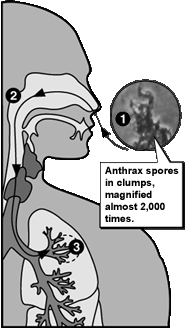Jitters and Hoaxes Abound After Florida Anthrax Death
By CAROLYN ABRAHAM AND BRIAN LAGHI
With a report from Ingrid Peritz, Reuters and Associated Press.; SOURCES: Associated Press; ESRI; GDT,; Centers for Disease Control and Prevention;; The Merck Manual of Diagnosis and Therapy;; Medical Aspects of Chemical and Biological Warfare
Wednesday, October 10, 2001 – Print Edition, Page A1
Fear and panic spread like germs across North Canada yesterday as U.S. health officials tested hundreds of people in Florida for possible exposure to anthrax.
Authorities in Montreal cordoned off several blocks and removed 80 people from a downtown office building after staff there received an envelope from Canadian Media Inc. in Boca Raton, Fla.
Canadian Media, publisher of The National Enquirer and a string of other supermarket tabloids, owns the Florida building where officials suspect anthrax was deliberately released. One man has died and another has tested positive for exposure to anthrax bacteria.
In Barefoot Bay, Fla., health officials wearing biohazard suits sealed off the residential street of a man who telephoned them yesterday morning saying he was sick and that two months ago he had received a package containing a powdery substance. Officials drove the man to a hospital isolation unit.
In Washington, 21 people were in isolation yesterday after an armed man dropped a plastic, liquid-filled bottle at a subway station. Passengers complained of nausea, headaches and sore throats. A Justice Department official said the fluid was a harmless bottle of carpet cleaner.
Police said the 23-year-old man, who fired a gun as police arrested him, is not believed to be a terrorist.
As sure as gas masks are flying off store shelves and health officials are stockpiling antibiotics, the incidents appear emblematic of wide-scale public fretting since the events of Sept. 11 and the confirmation of a lethal case of anthrax, a bacteria thought to be a favoured biological weapon.
Health Minister Allan Rock tried to assure Canadians yesterday that the possibility of a mass bioterrorist attack is remote.
He is to meet his U.S. and British counterparts in Washington today to develop strategies to cope with the threat.
“I think the biggest disease we have to face right now is fear,” said Mr. Rock. “There’s no reason for Canadians to regard this as anything but a remote threat, but, that having been said, Health Canada is working very hard to make sure we’re ready for whatever might happen.”
Montreal public health official Paul Le Guerrier said the chances that anyone was contaminated by the envelope from Boca Raton are “practically nil,” because the envelope hadn’t been opened. “We told people not to worry,” he said, adding that it will take 48 to 72 hours to analyze whether the envelope contained any organic material.
The envelope was received at the Sherbrooke Street offices in Montreal of Globe International Inc., whose publishing assets were acquired by Canadian Media Inc. in 1999.
U.S. health officials said yesterday that no other Florida employees of Canadian Media had so far tested positive for anthrax exposure, despite reports to the contrary. They also said a Virginia man suspected of being infected with the bacteria also tested negative.
But health officials could offer no new evidence to suggest the anthrax cases were not the product of foul play.
Barbara Reynolds, a spokeswoman with the U.S. Centers for Disease Control, said federal investigators had eliminated all the obvious environmental sources that might offer a natural explanation for the country’s first cases of inhalation anthrax in 25 years.
CDC director Jeffrey Koplan was apparently more blunt. Florida Senator Bob Graham said Dr. Koplan told him that the chances of this occurring without human intervention would be “nil to none.”
In the past, naturally occurring cases have usually involved the victim inhaling spores from animal products, particularly from the dried hides and furs of goats, sheep and cows.
Still, federal officials have no evidence that the anthrax cases are the product of bioterrorism. And in the meantime, they are chasing every available lead, from the disgruntled e-mail of a summer intern to the powdery package sent by a lovesick fan of Jennifer Lopez to the tabloid newsrooms of the Boca Raton building. Letters and packages are of special interest to investigators because the second man who tested positive for anthrax exposure was a mailroom clerk.
News reports on Monday suggested that a summer intern had left his co-workers an ominous message before he departed, saying, “I left you all a little present.”
The “present” turned out to be bagels and cream cheese, said Frank Penela, spokesman for the Florida Department of Health.
The summer intern is now among the 750 people being tested for anthrax exposure.
The CDC is asking that anyone who spent more than an hour in the building after Aug. 1 to undergo the tests and take a two-month preventive course of antibiotics.
Anthrax investigation
Anthrax is caused by a bacterium found in nature called Bacillus anthracis that can infect the lungs, skin or gastointestinal tract. Symptoms usually appear within a week of exposure, and if diagnosed quickly, may be treated with antibiotics. The Florida man who died of anthrax contracted the inhaled form, which, if left untreated, is fatal.
Inhalation Anthrax
Inhaling anthrax spores can bring on the disease if the spores go deep into the lungs, especially in people who already have a respiratory infection, like a cold.
1. Anthrax spores are dormant forms of the bacteria. Like seeds, they germinate only in a warm, moist environment.
2. If inhaled, larger spores lodge in the upper respiratory tract, where they are less dangerous.
3. Smaller spores penetrate the alveoli, the tiny sacs in the lung. The immune systems responds, destroying some spores but carrying others to the lymph nodes in the chest.

Here the spores germinate. Within one day, or up to 60, anthrax begins to multiply, infecting chest tissues and producing toxins that enter the bloodstream. In the lungs, the toxins can cause bleeding, fluid collection and tissue decay.
Cutaneous : Accounts for 95 per cent of cases. It spreads through the skin, when people come into contact with tissue or hides from infected animals. It appears as a lesion on the skin that eventually is covered by a black scab. The disease produces headaches, muscle aches, fever, nausea and vomiting.The other forms of Anthrax
Treatment : antibiotics are effective. Untreated, about 20 per cent of cases result in death.
Gastro-Intestinal : Can develop in people who eat undercooked meat from infected animals. It can produce bleeding in the abdomen, leading to tissue death and potentially fatal blood poisoning.
Treatment : Without antibiotics, 25 per cent to 60 per cent of cases result in death.
